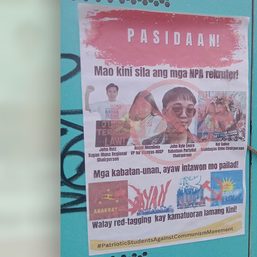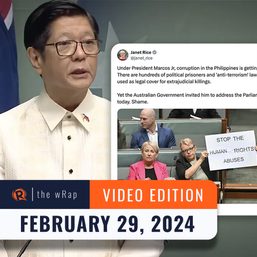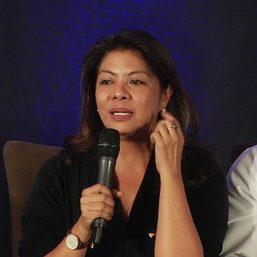SUMMARY
This is AI generated summarization, which may have errors. For context, always refer to the full article.
Senate Minority Leader Franklin Drilon has filed a bill seeking to define and criminalize the act of red-tagging, citing the prevailing culture of impunity that has endangered the lives of dissenters tagged as enemies of the state.
Alarmed by the rising cases of red-tagging under President Rodrigo Duterte’s government, Drilon filed Senate Bill (SB) No. 2121 on Wednesday, March 24. A copy of the bill was given to reporters on Thursday, March 25.
If passed into law, SB 2121 would define the practice of red-tagging as any state actor – including law enforcement agents and military officers – “who labels, vilifies, brands, names, accuses, harasses, persecutes, stereotypes, or caricatures individuals, groups, or organizations as state enemies, left-leaning, subversives, communists, or terrorists as a part of a counter-insurgency or anti-terrorism program or strategy.”
Anyone found guilty of red-tagging faces up to 10 years in prison.
If the convicted person is a public official, he or she would also be disqualified from holding public office.
A Senate panel that earlier probed the red-tagging practices of government officials had concluded that there is supposedly no need to pass a law criminalizing this act. But Drilon thinks otherwise.
“Contrary to popular assertions, there are no sufficient and available legal remedies for victims of red-tagging. Victims are left without proper recourse against their perpetrators and are forced to file seemingly-appropriate-but-not-quite cases, like libel and grave threats,” said Drilon.
Drilon, a former justice secretary, said these are not enough, since libel or grave threats are not appropriate in cases of state agents vilifying a person as an enemy of the state, “thereby impinging on the rights of that individual.”
Drilon argued that red-tagging has a “chilling effect” on dissenters, as several people accused of being communist rebels have been killed, like human rights worker Zara Alvarez and Dr Mary Rose Sancelan, city health officer of Guigulngan City, who was shot dead along with her husband.
The senator also said members of the legal profession have not been spared from this “systemic and calculated vilification as enemies of the state,” which led him to file a Senate resolution condemning the killings of lawyers, prosecutors, and judges.
“This continuing government public branding has threatened the very life, liberty, and security of the vilified men and women. It has resulted to serious human rights violation such as harassments, arbitrary arrests, detentions, and enforced disappearances. In some cases, being red-tagged is a prelude to death,” said Drilon.
On Wednesday, Senator Leila de Lima also filed a separate Senate resolution calling for an investigation into the rampant red-tagging and undue investigation of lawyers, judges, and teachers by law enforcement agencies.
“The serious and continuing threats against lawyers and judges, as the sentinels of the rule of law, and teachers, as guardians of learning sanctuaries, who are being victimized in their very offices and schools expose how the State, who is supposed to protect them, disregards the importance of rule of law and democracy,” said De Lima in Proposed Senate Resolution No. 689.
Red-tagging of activists has intensified under the Duterte administration, with police and military officers sharing social media posts accusing activists, human rights workers, and even lawmakers of having ties with the Communist Party of the Philippines.
Last March 7 – days after Duterte renewed his “shoot-to-kill” order against communist rebels – the police and military conducted raids across Calabarzon that left 9 activists dead.
Now dubbed as the “Bloody Sunday” killings, the deadly operations took place months after the passage of the anti-terror law. Critics have warned the law could be used by the Duterte government to go after its critics.
The law’s constitutionality is currently being challenged before the Supreme Court. – Rappler.com
Add a comment
How does this make you feel?




![[OPINION] Jhed and Jonila’s fight for justice](https://www.rappler.com/tachyon/2024/02/TL-jhed-and-jonilla.jpg?resize=257%2C257&crop=411px%2C0px%2C1080px%2C1080px)
There are no comments yet. Add your comment to start the conversation.